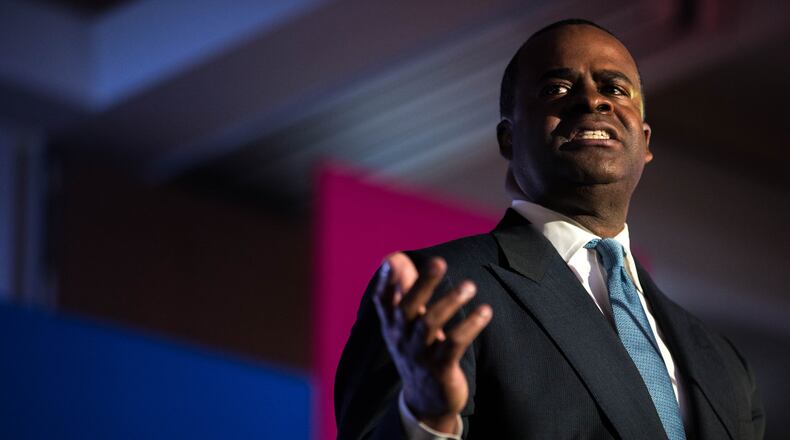In his last “state of the city” speech as mayor of Atlanta, Kasim Reed on Thursday said two of his top priorities during his final year in office will be addressing homelessness and securing funding for the art.
Reed said he plans to seek a referendum for a one-tenth of a penny sales tax increase to boost arts funding and that city officials expect to allocate $25 million toward programs for the homeless.
"Organizations like the Woodruff Arts Center are thriving, but our small- and medium-sized groups, our young and emerging arts, need additional support," Reed said during the speech, which lasted nearly an hour. "We need to give back to the creative community that gives so much to our city."
Reed said the United Way of Greater Atlanta has pledged to match the city's spending on homelessness with $25 million.
“Today, we are making a $50 million commitment that will reinforce Atlanta as a place where opportunity and human dignity come first,” he said.
Thursday’s speech was an emotional farewell for the mayor, who teared up as he thanked his parents for their guidance and faith.
Reed shared a story about getting a call during his first campaign for the mayor’s seat from former Mayor Andrew Young. His conversation with Young came at exactly the right time, he said, when he was feeling discouraged about his chances of winning. The civil rights leader offered Reed a shoulder to cry on and told him that he could call anytime.
“I believe with all of my heart that was the turning point in my effort to become mayor of Atlanta,” he said.
Reed ran down a laundry list of accomplishments — attracting big companies such as NCR Corp. to the city, building Atlanta’s cash reserves from $7.4 million to $153 million, and the undertaking of a $30 million project to renovate Martin Luther King Drive.
“It has been the honor of my life to serve in this position,” he said.
Reed’s proposal for a one-tenth of a penny sales tax increase for the arts comes just months after voters overwhelmingly approved two other sales tax increases that will hike Atlanta’s sales tax to 8.9 percent.
Voters in the city of Atlanta agreed to a half-penny increase to raise $2.5 billion for MARTA and another four-tenth’s of a penny to raise more than $300 million to synchronize traffic signals, build sidewalks and buy the remaining right-of-way for Atlanta Beltline.
Reed has frequently boasted that he's gotten things done in the city without raising property taxes. The $1.5 billion Mercedes-Benz Stadium is being partially paid for with $200 million in hotel-motel taxes. The majority of a $192 million renovation of Philips Arena will be paid for with car rental taxes.
The mayor will need support from the Atlanta City Council and the Georgia General Assembly to get the latest tax increase proposal on the ballot in November.
If it passes, Atlanta’s sales tax would increase to 9 percent and would be among the highest in the nation, behind such cities as Seattle at 9.6 percent, Oakland at 9.5 percent and Chicago at 9.25 percent, according to Tax Foundation figures. Los Angeles and New Orleans are even with Atlanta at 9 percent, while Charlotte and Orlando are at 7.25 percent and 6.25 percent, respectively.
Tom Smith, an Emory University economist, said ordinarily the public would be fatigued by so much taxing, but the tremendous support for November’s transportation referendum has shown Atlantans are willing to pay more. The MARTA vote passed by more than 70 percent while the city transportation measure passed by more than 67 percent.
An arts-centric referendum might be a harder sell, though, but for a different reason than fatigue.
“The arts comes last in a lot of people’s minds,” he said.
Proposed cuts to the National Endowment for the Arts and the National Endowment for the Humanities mean support from the city is even more needed, arts leaders said Thursday.
“When public funding for the arts nationally is being threatened, it couldn’t come at a better time,” said Chris Appleton, co-founder and executive director of the community arts group WonderRoot.
Monica Campana, co-founder of Living Walls, said any assistance “would make a huge difference, especially when it comes down to creating work for artists in the city, creating public art, being able to sustain the organization and feed people.”
The mayor said his latest push to address homelessness is partly due to his expectation that the Peachtree-Pine Shelter downtown eventually will close, and he wants the city to have a plan to address those who need shelter.
“Some of those dollars will be involved in alleviating the issues and the concerns that were raised around Peachtree-Pine and expanding our shelter capacity in a first-rate fashion,” he said. ” I just wanted to send a clear message that, while I have a different opinion about the effectiveness of Peachtree and Pine, we’re certainly not going to not have the appropriate shelter capability in the city.”
Bo Emerson and J. Scott Trubey contributed to this story.
About the Author
The Latest
Featured


